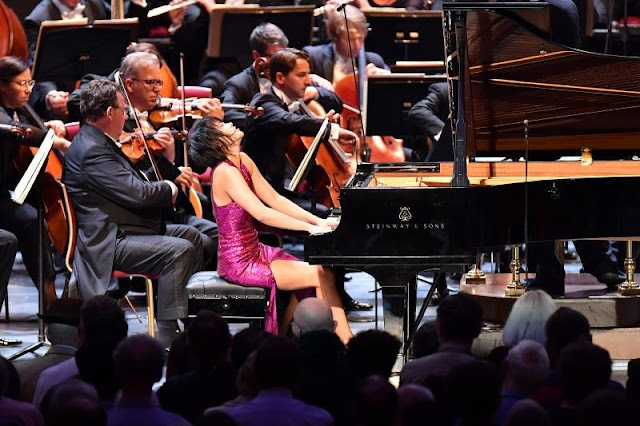Revisiting the Rach 3 – Asides (II)
Chinese pianist Yuja Wang had just finished the first of two
encores and, turning to my promming buddy Seymour, I remarked "That sounded like
Mahler." With the kind of disdain that Jeremy
Paxman reserves for incorrect students on University
Challenge, Seymour gave it to me with both barrels: "Mahler? Mahler doesn't do piano pieces!" He suggested that it might well have been Chopin,
but it turned out that it was another Rachmaninoff piece, something much gentler
than his Piano Concerto No.3 in D minor
which we had just listened to.
I'm still learning when it comes to classical music, and I've got a long way to go, no doubt about it. And last night I discovered that after years of toing and froing, I love the Rach 3. I first came across it in 1997 in the film Shine when me and my shipmate Pompey Lou decided to escape the stifling Singapore heat, seeking shelter in an air-conditioned cinema. Any film would do. In fact a few days earlier I'd watched The English Patient for exactly the same reasons. You might recall Shine, Geoffrey Rush's depiction of the life of Australian pianist David Helfgott who suffers a mental breakdown in an attempt to get to grips with the notoriously difficult piano concerto. The music in that film left me mesmerised, and before we sailed I made sure that I'd purchased a CD featuring the piece. However, after giving it a few plays on my Sony Discman, where the gentle lolling of the Indian Ocean never required the Discman's anti-roll function to kick in, I found myself struggling to enjoy or appreciate it. To my untutored ears it was bombastic and unstructured and, yes, rather dull. Later I would come to prefer Rachmaninoff's Piano Concerto No.2, enjoying how Eric Carmen alluded to it in his 1970s tearjerker of a ballad 'All By Myself'. I cast aside the Rach 3.
 |
| Yuja Wang |
I'm still learning when it comes to classical music, and I've got a long way to go, no doubt about it. And last night I discovered that after years of toing and froing, I love the Rach 3. I first came across it in 1997 in the film Shine when me and my shipmate Pompey Lou decided to escape the stifling Singapore heat, seeking shelter in an air-conditioned cinema. Any film would do. In fact a few days earlier I'd watched The English Patient for exactly the same reasons. You might recall Shine, Geoffrey Rush's depiction of the life of Australian pianist David Helfgott who suffers a mental breakdown in an attempt to get to grips with the notoriously difficult piano concerto. The music in that film left me mesmerised, and before we sailed I made sure that I'd purchased a CD featuring the piece. However, after giving it a few plays on my Sony Discman, where the gentle lolling of the Indian Ocean never required the Discman's anti-roll function to kick in, I found myself struggling to enjoy or appreciate it. To my untutored ears it was bombastic and unstructured and, yes, rather dull. Later I would come to prefer Rachmaninoff's Piano Concerto No.2, enjoying how Eric Carmen alluded to it in his 1970s tearjerker of a ballad 'All By Myself'. I cast aside the Rach 3.
 |
| Yuja Wang |
Yuja Wang and the Staatskapelle Dresden brought it back though. Standing in the gallery of the Royal Albert Hall I realised just how physical and visual a piece of music it is. Without the visuals I'd been drawn in completely by the piano. But what struck me last night was the battle between the strings and Yuja Wang's performance. It was mesmerising: the ferocity of the latter's playing and the way the gentle calm of a dreamy trill of notes suddenly, as if a medic was applying a defibrillator to a flat-lining patient, jolted into a violent and all-too alive rage; the way that the rest of the orchestra rose to the occasion, picking up the baton and duking it out. And then back to Wang: shoulders swaying between both ends of her grand piano, her hair growing increasingly dishevelled, and the way that she mopped her brow and took a break in the orchestral moments, all testament to the immense challenge that she faced. And that she did all this in a pair of Louboutin high heels (so I'm told) makes it all the more impressive.
 |
| Myung-Whun Chung, conductor of the Staatskapelle Dresden |
Seymour's verdict was appropriate: "I reached grade 8 in my piano playing, and let me tell you, what you're listening to is something else … like watching Roger Federer at the top of his game!" It was almost a relief to then encounter the pastoral sweetness of Brahm's Symphony No.2 for the second half of the prom. I settled down horizontally – one of the perks of promming in the gallery rather than in the thronged arena – and let the music ripple over me. The tempest that had gone before, though, had left its mark.


A breathtaking performance on the piano.
ReplyDelete